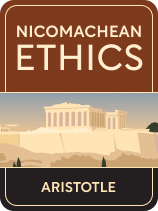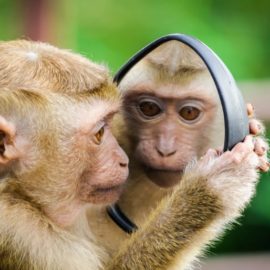

This article is an excerpt from the Shortform book guide to "Nicomachean Ethics" by Aristotle. Shortform has the world's best summaries and analyses of books you should be reading.
Like this article? Sign up for a free trial here .
How are we limited in our pursuit of happiness? Can we still be happy?
We can reason, so we’re above the animals. But, we can’t eternally contemplate, so we’re below the gods. In his Nicomachean Ethics, Aristotle addresses human limitations and discusses how we still can strive for happiness, even within constraints.
Keep reading for Aristotle’s views on human limitations.
Limitations of a Human Life
An ideal happy life consists only of contemplation—however, that’s not realistic for any human life. Instead, Aristotle suggests that human limitations—particularly the human capacity to philosophize (and therefore be happy)—place us somewhere between animals and gods:
- Animals can’t use reason, and therefore can’t live happy lives (since happiness is rational activity aligned with virtue).
- The gods are eternally contemplating, and therefore perfectly happy.
Humans can reason, but, unlike the gods, they can’t spend their entire lives on philosophy. All humans by nature will spend some time meeting physical needs and interacting socially with others—eating, sleeping, and fulfilling obligations to friends, family, and community.
The social nature of humans also means that, even in a contemplative life, a person must be morally virtuous: Humans inevitably interact with each other, and moral virtues are the best possible guidelines for those interactions. Therefore, the happiest possible human is morally virtuous in their interactions, meets their physical needs, and spends as much time as they can on philosophical inquiry.
(Shortform note: Aristotle makes a sudden shift here from discussing the ideal and happy human life to discussing the happiest possible human life—a shift that seems to restrict or even prevent the possibility of human happiness. To resolve this confusion, some scholars argue that Aristotle only mentions these limitations to avoid political consequences. From this perspective, Aristotle separates the perfect lives of the gods from the “imperfect” lives of humans to appease the dominant political and religious beliefs of Athenians. Therefore, these scholars claim that Aristotle doesn’t seriously argue that humans can’t live happy lives or that a happy life is almost impossible. Instead, he just makes that claim to avoid censorship or punishment.)

———End of Preview———
Like what you just read? Read the rest of the world's best book summary and analysis of Aristotle's "Nicomachean Ethics" at Shortform .
Here's what you'll find in our full Nicomachean Ethics summary :
- Aristotle's philosophies on topics such as happiness, virtue, and wisdom
- What it means to be morally virtuous and how someone can develop moral virtue
- How wisdom contributes to the possibility of a happy life






